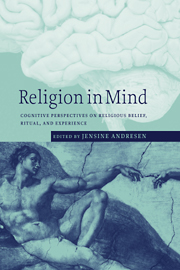1 - Introduction: towards a cognitive science of religion
Published online by Cambridge University Press: 02 December 2009
Summary
We are witnessing the birth of a new field and a new approach to understanding religion. Spurred on by two decades of advance within the field of cognitive science, scholars within many disciplines have begun to apply cognitive science concepts to a diverse array of phenomena. Although considered by some to be sui generis, the domains of religious experience, belief, and behavior have not been exempt from such treatment. Indeed, in the last decade, scholars from varied disciplinary arenas increasingly are willing to tackle, both individually and collaboratively cognitive theories of religion in general and the neural bases of religion in specific. Activity has coalesced around the emergence of a coherent area of research and writing, what I refer to here as a “cognitive science of religion” following Lakoff and Johnson's (1999) recommendation that we replace the “philosophy of x” with the “cognitive science of x.” This so-called cognitive science of religion is, first and foremost, a scientific and explanatory endeavor that draws on findings from the various sciences of mind. Like Lakoff and Johnson's loosening of philosophy from its analytic-cum-transcendent moorings, our endeavor is similarly “bottom up” – we propose to free religion from the realm of metaphysical speculation and to anchor it instead in the empirical. At the same time, we seek to respect deeply the integrity of religious qualia, the phenomenology of religious experience, and the sincerity of religious belief. We therefore engage the general problems of belief and subjectivity while eschewing reductionism. Although we attempt to explain certain facets of religious experience, belief, and behavior, we do not, by any stretch of the imagination, attempt to “explain them away.”
- Type
- Chapter
- Information
- Religion in MindCognitive Perspectives on Religious Belief, Ritual, and Experience, pp. 1 - 44Publisher: Cambridge University PressPrint publication year: 2001
- 3
- Cited by



